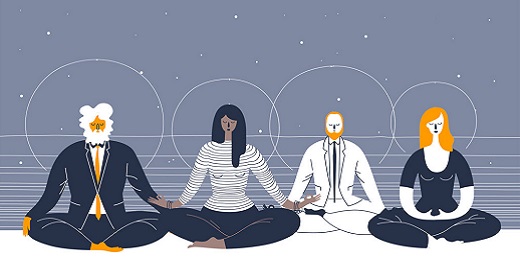by Chad Foreman: I’m inspired to write this blog because my meditation skills and calm composure have been put to the test…
in a big way recently and I have gained deeper insight into the benefits and application of pliancy of mind as developed in mindfulness meditation. In the ancient Buddhist meditation manuals it says that pliancy is fully achieved after mastering concentration meditation which is called shamatha meditation in Buddhist terms. But what does it really mean to have pliancy of mind and how does mindfulness meditation help?
Mindfulness Meditation
Concentration meditation is a typical type of meditation common to most Buddhist and Hindu traditions, there’s nothing mystical about it but it’s also not that easy either. It’s simply the training of sitting still in meditation and focussing single pointedly on an object like your breath, holding a visualisation in mind or just observing your posture. I have joined the modern meditation movement and call it mindfulness like so many other meditation teachers today because you are simply mindful of something with a non judgemental awareness without being distracted.
This type of mindfulness meditation helps to develop a stable mind not easily disturbed by strong emotions, can easily focus on its chosen object and is vivid with clarity. All that always made sense to me but how can focussing on an object without moving away from it develop a flexible mind? It wasn’t until recently when I re-entered the work force with a job caring for traumatised teenagers that I realised how these skills translate into useful skills of mind. In retreat or in daily meditation I experienced clarity and peace but it wasn’t until I was challenged by teenagers abusing me, demanding my attention and even physically threatening me that I realised how my meditation skills truly are vital in difficult life circumstances.
It’s not the focussing on an object in mindfulness meditation that increases flexibility of mind, it is the introspection I had developed by noticing when my mind was distracted and then detaching from the distraction and gently returning to my meditation. It’s in this mental gymnastics that I developed the mental skills supporting my adaptability in difficult situations.
Often mindfulness meditation is taught as a way of being aware without being caught in thoughts and that’s fine on your cushion, as a therapeutic tool or to calm down on a break but during daily life we regularly need to use our minds and thinking process. Being able to remove my mind from one way of thinking and adopt a new way of thinking that adapted to the situation helps enormously. Adaptation is a quality that helps us survive and thrive in the ever changing circumstances of life. Changing or consciously choosing your perspective is a powerful tool for understanding and connecting with others and also achieving freedom of mind. As Deepak Chopra said:
“Every time you are tempted to react in the same old way, ask yourself if you want to be a prisoner of the past or a pioneer of the future.”
Pliancy of mind aids in the development of understanding and compassion. For example when one teenager spat in my face for no particularly good reason I was immediately insulted, combative and angry, but quickly caught my mind being distracted by angry thoughts and reminded myself of the person’s horrific life so far which included years of sexual abuse and neglect as a small child. I then returned my mind to a more compassionate and gentle approach which benefited me by helping me calm down and also helped me to attend to the needs of the teenager in a skilful way which included re-establishing appropriate boundaries of behaviours and also showing unconditional kindness which helped to transform the negative attitudes of this young girl.
Pliancy of mind also helps to develop wisdom and adopt new knowledge. Through the ability to entertain other people’s perspectives without dogmatically insisting that you are right helps to learn new things and challenge your own ideas which may need updating.
As Albert Einstein once plainly said:
“The measure of intelligence is the ability to change.”
Not having pliancy can be seen in a stagnant and stubborn mind that will often need familiarity and routine just to feel safe. That might be fine until things change, which they inevitably do. Perhaps you are stuck in a rut and cannot get your mind to move onto new things. Perhaps you resist change and even ‘self sabotage’ so you don’t have to change. Or perhaps you are stuck in old opinions or an outdated self image. These are all examples of how a mind that is not pliant will suffer and harden.
The basic mindulness skill I am talking about here is the mental ability to place your mind on what you want to focus on and not be dictated by habits or pre conceived ideas. Which includes the ability to immediately drop a thought and return to a clear and fresh state of mind. This is particularly important for good mental health because negative states of mind are often associated with rumination and getting stuck in trains of thought that don’t serve us and often don’t just last for a few hours at a time but sadly can sometimes last for months or even years. Not being able to drop resentment, regret or negative judgements about yourself or others is truly a disease of the mind.
“Pliancy of mind prevents us from developing one-sided views and becoming stuck in our ways. Conditions are always changing in our lives and it is mental pliancy that helps us to flow with change.”
Often we have goals that are too narrow and even restrictive. With a flexible mind you can adapt to new changing circumstances and even though things don’t work out exactly as you wanted you can easily see opportunity in the new situation instead of rigidly sticking to exactly what you want. Don’t let goal setting become too fixed, remain flexible and allow room for intuitive changes.
Having a flexible mind helps to embrace change in our lives and give new things a try. Having a flexible mind makes it workable, manageable and easily employable, able to work for your benefit and others around you. Through the skills developed in mindfulness meditation you can easily take your mind off one thing and put it on what you want consciously and intentionally. Being able to move it around at will and keep it stable is mind’s pliancy.
The Flexible Personality
Through mindfulness meditation training we begin to create the space to see how our personality is not fixed. The idea of no-self in Buddhism really means that there is no fixed self which allows you to adopt the most appropriate character in any circumstance. Going with the flow of ever changing events, sensitive to the subtle changes and flexible enough to accordingly. You can even experiment and try on new ways of being in the world. You can attempt to be more assertive at work, more playful with the kids or try on being more kind to strangers.
With pliancy of mind you don’t have to act in the same old ways, you can change, you can drop habits that do not serve you or others and adopt habits that are beneficial for your health, happiness and relationships. With an understanding that there is no fixed self and nothing dictating your behaviour you can experience the true freedom to be whoever you want and play with life by accessing the infinite possibilities of genuine creative expression.
Pliancy of mind is like the ability to bend and flex with the changing winds of life. Just like a tree’s branch that is too stiff will easily snap, when your mind is too rigid and set in its ways it is easily disturbed and traumatised. A flexible mind can bend and sway with circumstances without breaking and therefore manage the inevitable changes of life smoothly.










































